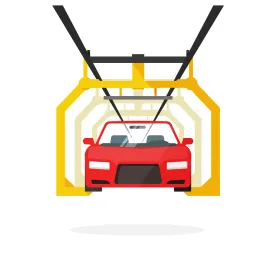Key Takeaways
-
What Happened: The California Air Resources Board (CARB) issued a “Dear Manufacturer” letter encouraging vehicle and engine manufacturers to voluntarily self-disclose regulatory violations in a variety of mobile source categories.
-
Who’s Impacted: Vehicle and engine manufacturers that have potential noncompliance issues associated with their California-certified vehicles and/or engines, including those in the following mobile source categories:
-
Passenger cars
-
Light-, medium-, and heavy-duty vehicles and engines used in such vehicles
-
On-road motorcycles
-
Off-highway recreational vehicles
-
Off-road small and large spark-ignition engines and equipment
-
Off-road spark-ignition marine engines and watercraft
-
Off-road compression-ignition engines
-
Aftermarket parts
-
Diesel emission control strategies
-
-
What Should Vehicle and Engine Manufacturers Do in Response to CARB’s Action: Assess the product compliance of their California-certified vehicles and/or engines and consider voluntarily self-disclosing to CARB any potential non-compliance.
-
By When Should Vehicle and Engine Manufacturers Act: CARB stated that voluntarily self-disclosing by December 31, 2020, and expeditiously settling matters thereafter, “will substantially mitigate the associated penalties.”
Voluntarily Self-Disclosing by the End of 2020 May Lead to Reduced Penalties
On October 14, 2020, CARB issued a “Dear Manufacturer” letter encouraging vehicle and engine manufacturers to voluntarily self-disclose potential violations associated with their California-certified vehicles and/or engines by December 31, 2020.[1] According to CARB, making a voluntary self-disclosure could lead to a penalty reduction of between 25 and 75 percent, depending on the relevant facts and circumstances, and the extent to which a regulated party meets the voluntary disclosure criteria in CARB’s enforcement policy.
Although the potential penalty reduction range discussed in the “Dear Manufacturer” letter is consistent with CARB’s enforcement policy (i.e., between 25 and 75 percent), CARB appears to be signaling to manufacturers that it will exercise its discretion and reduce penalties to a greater extent if violations are self-disclosed before the end of 2020 as opposed to next year and beyond. Therefore, vehicle and engine manufacturers should assess their product compliance and consider making voluntary self-disclosures sooner rather than later. Indeed, the potential penalty reduction could be significant when considering CARB can assess per-violation penalties up to $37,500 for each mobile source or engine at issue.
At the same time, manufacturers should consider whether any potential noncompliance also warrants submitting a voluntary self-disclosure to the U.S. Environmental Protection Agency.
CARB’s Focus on “Systemic Violations”
CARB’s “Dear Manufacturer” letter asserts that recent CARB screening tests and investigations have revealed a variety of “systemic violations.” These include:
-
Undisclosed Auxiliary Emission Control Devices (AECDs): CARB test procedures require manufacturers to disclose all AECDs installed on their vehicles.
-
Defeat Devices: Manufacturers must justify each AECD and provide a rationale for why it is not a defeat device. An AECD is a defeat device unless it falls into one of four categories: (1) the AECD conditions are substantially included in the federal emission test procedures; (2) the AECD is necessary to protect the vehicle against damage or accidents; (3) the AECD does not go beyond the requirements of the engine starting; or (4) the AECD is justified for use in emergency vehicles.
-
Unapproved Running Changes and Field Fixes: Manufactures must report post-certification changes to emissions-related hardware and software, including changes to the on-board diagnostic (OBD) system. These changes include ones that occur both on the assembly line and implemented in the field.
-
Failure to Report or Address Warranty Claims: When claims meet or exceed specified thresholds, manufacturers must file emissions warranty information reports and field information reports and initiate corrective actions, such as recalls.
-
Noncompliant Manufacturer In-Use Compliance Testing and Manufacturer’s Self-Testing (MST): Manufacturers must timely complete their MST and/or submit test data to CARB and notify CARB and receive approval of any substitution of parts before conducting MST demonstrations. CARB has also expressed concern that manufacturers are not properly completing their in-use verification program (IUVP) and heavy-duty in-use testing (HDIUT) obligations.
-
Failure to Report Corrective Actions That Should Be Under a CARB-Approved Recall Plan – not a Technical Service Bulletin or Other Field Fix: CARB must review and approve voluntary, influenced, and ordered emissions recall plans before they are implemented.
-
Submission of False Data or Non-Compliance with Regulatory Test Requirements: All data and information submitted to CARB must be true, accurate, and complete, and all manufacturers must use the applicable test procedures.
-
Failure to Meet OBD Requirements: All manufacturers must meet OBD requirements and conduct and timely report the results of Production Engine/Vehicle Evaluation Testing. Those requirements must be met not only during certification test cycles but also during in-use driving.
-
Failure to Disclose Adjustable Parameters That May Affect Emissions: Manufacturers must disclose adjustable parameters on a motor vehicle or engine that affect emissions.
CARB has and will continue to prioritize its enforcement efforts around these issues, evidenced by its latest letter and its numerous investigations and enforcement actions in recent years. Noting the upcoming 2021 opening of its “new state-of-the-art” testing laboratory, CARB’s letter admonishes manufacturers to voluntarily self-disclose potential violations before its “new techniques” and lab “inevitably detect any violations,” leading to future enforcement actions.
Vehicle and Engine Manufacturers Should Consider Voluntarily Disclosing Non-Compliance Before the End of 2020
Given CARB’s continued and renewed focus on what it calls “systemic violations,” vehicle and engine manufacturers should (i) evaluate the extent to which their California-certified products comply with applicable regulatory requirements, and, to the extent noncompliance is identified, (ii) consider whether to voluntarily self-disclose such noncompliance. Doing so by the end of this year may lead to reduced penalties and could be an effective measure to mitigate the possibility of costly enforcement actions and the potential imposition of increased enforcement penalties.
[1]CARB’s latest alert follows up on its September 2015 “Dear Manufacturer” letter reminding manufacturers to, among other things, properly disclose all auxiliary emission control devices at the time of certification, urging manufacturers to “proactively inform CARB of undisclosed software devices and reintroduce a level of trust and forthrightness into the certification process.”





 />i
/>i
